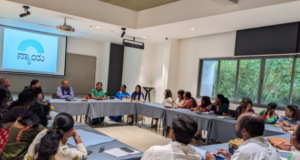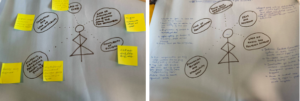May 26, 2023
Bangalore Changemakers Come Together to Make Justice More Accessible
About the Workshop
“Access to justice” is universally considered as a key component of a country’s development. However, according to the latest findings related to access to justice, between 2020 and 2022, the number of legal services clinics across India dropped by 44%. In fact, while over 80% of Indians are eligible for legal aid services, less than 1% of the total population have availed of legal aid services. This throws light on the glaring reality of the existing barriers to accessing justice and how geographical, social and economic disparities continue to make the legal system daunting and inaccessible for most.
Furthering its efforts to provide last mile legal support through the Samvidhaan Fellowship, Nyaaya assembled a constellation of changemakers, with the representatives from the judiciary, police force, government, law schools, civil society organisations and lawyers, on April 29, 2023, to collectively understand the various barriers to justice and outline a roadmap to overcoming them at the Bangalore International Centre.
The workshop was attended by Mr. Raghavendra Shettigar, Deputy Secretary, Karnataka State Legal Services Authority, Mr. Suneel Kumar, Retd. DGP (CID) of Karnataka Police, Ms. Pushpa Muddulingannavar, Deputy Director (Women Welfare), of the Department of Women and Child, Government of Karnataka, representatives from educational and philanthropic institutions along with our Karnataka based partner organisations, Best Practices Foundation, SICHREM, Solidarity Foundation, Hasiru Dala, Enable India, Vimochana, Stree Jagriti Samiti, CIVIC and Nyaaya’s Samvidhaan Fellows and team. It was an extremely diverse and insightful audience who shared their experiences with law and justice, its accessibility and enforceability through the lens of their respective areas of work.
Barriers to access to justice
The participants identified multiple systemic and societal challenges in accessing justice. Some of these obstacles can be enlisted as :
- Many of the citizens are unaware of their legal rights and even if they are aware of their rights most do not know how to enforce them .
- Ingrained fear and mistrust of law enforcement bodies, paired with lack of empathy in the first responders. For instance, migrant labourers in Bangalore are scared to approach the authorities for the fear of graver repercussions or simply being dismissed as an outsider.
- Lack of moral and systemic support. For instance, absence of women officers at the police station makes a lot of complainants of gender based violence uncomfortable and inhibited.
- Ground level workers are mostly fund-starved, therefore administrative and operational efficiencies are severely impacted.
- The complexity of the system often makes the unversed citizens more prone to exploitation. For example, middlemen take bribes or pass on false information for years and the aggrieved person has no means to verify such information.
- Facilitators of access to justice, i.e. legal aid lawyers, government departments, police etc. often do not have any accountability and often the justice seekers are left in a quandary with little to no remedy.
- Justice systems are often too complicated to navigate and what makes it worse is the fact that discrimination on the basis of one’s caste and gender identity continues to be rampant. For example, in-charges of certain public spaces prevent the entry of people from marginalised castes for events such as legal literacy programmes.
- Documentation is sporadic and unavailability restricts the citizens’ access to entitlements and easementary rights. For instance, children of migrant workers are routinely denied admission to state run schools due to the absence of identity proofs.
- Legal systems are fairly distant and far between so accessing them becomes a huge impediment to those with limited mobility and means. For example, in Karnataka, only 157 villages out of the total 27,397 villages have a legal aid clinic.
- Undue influence of politics often meddle with the justice delivery processes at the grassroots.
WCD’s Pushpa Muddulingannavar added that they struggle with a lack of human resources and are very understaffed at the district level and that there is delay in receiving funds from the Centre which adds another layer of complication.
The discussion highlighted that despite the collective will to ensure justice percolates to the last mile, there are numerous systemic hurdles that we need to address and overcome.
Potential Solutions
Since the workshop focused on creating systems to close the gap, we spent the next half of the workshop ideating together for viable and sustainable solutions. The importance of building empathy among the officials to respond to situations of distress or understand the nuances of a particular problem was emphasised upon. Some other impactful suggestions included;
- capacity building of counselling centres, para-legal volunteers from law colleges and community based organisations to enable some sensitive and actionable guidance to the aggrieved.
- the need for increased legal awareness programmes among the most underserved groups, coupled with actionable tools for enforcement.
- putting in place a robust whistle blowing process to enhance accountability and corruption
- strengthen informal justice delivery mechanisms to work together with formal structures.
- granting greater authority to civil society workers, based on their credibility and experience to assist the aggrieved throughout the legal process including testimonials, dispute resolutions regarding government schemes etc.
Since the inception of the fellowship, the Fellows have been able to connect with over 1000 people in Karnataka through 35 legal literacy programmes and over 100 explainer videos illustrating the legal rights and resources for reliefs in a particular situation, focusing especially on the rights of women and children.
The conversation from the workshop was undoubtedly invaluable to us and our Fellows to design more impactful interventions in bridging the gap in accessing justice in the upcoming months. It also infused us with hope to see the potential of transforming the current stopgaps when such multifaceted expertise joins forces. We came out of the discussion with renewed enthusiasm and resolve to create a holistic system in Karnataka as a pilot where every citizen will be aware of their rights and be unafraid to tread on the road to justice with minimal barriers. The event was covered in English and Kannada Media.
We are grateful to our guests for spending their valuable time at the workshop and enriching it with their thoughts and guidance. We envision this as the start of a series of immersive discussions where we will bring together stakeholders from relevant fields to collectively find solutions and work towards ensuring legal rights are accessible and actionable for everyone. We hope to receive the continued support of our mentors and collaborators.

